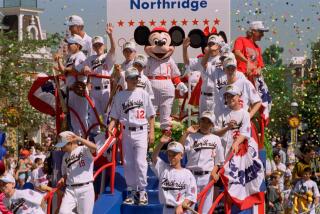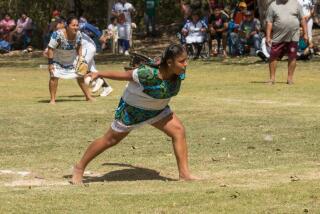National Agenda : Pitching an Image : Battered Nicaragua plays host to the world, hoping that baseball will burnish its reputation after 15 years of political violence and hardship.
- Share via
MANAGUA, Nicaragua — There were no television cameras or newspaper photographers in the bathrooms at Managua’s Estadio Rigoberto Lopez Perez last week, which was probably a good thing. Nevertheless, if you ask Yadira Soza and the rest of the women assigned to keep the stadium clean for the 32nd World Baseball Championships, a well-kept bathroom just might be what Nicaragua needs to get back on its feet.
The reputation of a country was at bat here.
“We’re in charge of keeping the stadium sanitary to leave a good image with those who have come here to Nicaragua, especially those from the 15 visiting countries,” Soza said. “I’m proud that we could put on the tournament here.”
After 15 years of war, drought, strikes, rising crime and recurring political violence, polishing Nicaragua’s tarnished international image is probably too great a task for Soza and her small crew alone. But many here were hopeful that a clean, well-run tournament--with sanitary restrooms--would mark the country’s first step toward mainline respectability.
“The majority of people here are in favor of the tournament,” said Edgard Rodriguez, sports editor of the daily newspaper El Nuevo Diario. “They feel the importance of the world championships to project a different image of Nicaragua--that this is not a country of war and that we have nice things too.”
Even the tournament’s official slogan, “Friendlier Nicaragua,” which was stamped on posters, banners and T-shirts all over the country, had been chosen with an eye to a new beginning.
“We are a hospitable people,” emphasizes Carlos Garcia, who organized the tournament. “We aren’t a country in which we are always fighting one another. The country is not bad like they say.”
And what better vehicle to send the message than the World Baseball Championships, which are not to be confused with the World Series but nevertheless brought to Managua 16 international teams including the high-ranked Cubans, Americans, Japanese and the host Nicaragua squad--all Olympic caliber.
Baseball has been king here since the early decades of this century, as it has been elsewhere in Central America and the Caribbean, where American power and influence prevailed. Teams travel from city to city, bringing the game and some relief to the nation.
The most optimistic boosters of the tournament--the first major sporting event to be held in Nicaragua in two decades--believe the event can do more than just improve the country’s international image. They’re hoping it will lift Nicaragua’s badly bruised national ego and sagging economy as well.
“Our people haven’t had much to be happy about, and I think this will help get their mind off their problems,” Cleveland Indian pitcher Dennis Martinez, one of five Nicaraguans to play in the U.S. major leagues, told The Times. “It can do so much for everyone’s spirits. I think it’s going to be really great for the country.”
Martinez starred for the Nicaraguan team in 1972, the last time the world championships were held in Managua. In the first round of that tournament, Nicaragua’s Julio Juarez shut out Cuba, 2-0, in what is still remembered as one of Nicaragua’s greatest sporting triumphs.
“There have been a lot of great things that have happened to me in this game, but that was one of the greatest moments I’ve ever had,” Martinez said. “(That) was as important as anything that has ever happened here. The whole country celebrated.”
But the celebration didn’t last long. Less than three weeks after the tournament concluded, a series of massive earthquakes leveled Managua, killing 10,000. Widespread government corruption in the quake’s aftermath helped ferment civic unrest, eventually leading to the bloody insurrection that dethroned dictator Anastasio Somoza Debayle in 1979.
But that was just the first of many blows Nicaraguans would have to endure. In short order, the country was ravaged by five-digit inflation, a hurricane, a volcanic eruption, a tidal wave, several droughts and an eight-year war against the U.S.-backed Contra rebels.
Arguments that a baseball tournament can overcome all that gain credence from the fact that the event has already had a beneficial effect on the economy by arresting the downward spiral of employment, if only temporarily.
“This is a great opportunity for me, even if it lasts just 12 days,” said Soza, who supports a family of five with the $8 a day she earns cleaning the stadium bathrooms.
Soza, who hadn’t worked for two years, is among the estimated 80% of Nicaraguans without steady work. She joined a line that stretched for more than five blocks to get the job, waiting hours to be interviewed for one of 500 positions created by the tournament. Those who made the initial cut were invited back for subsequent interviews over the next two months for openings as ticket takers, ball boys, vendors and janitors.
“As far as I’m concerned, the tournament is good because the people--me, for example--benefit,” said Luisa Cordero, who works 14 hours a day at the stadium selling popcorn. “And afterward, we have experience to go look for other work. Without the tournament, I’d just be sitting in the house.”
Not everyone has embraced the tournament, however. Shortly before the first pitch was thrown, a small bomb was detonated near one of the stadium’s light towers. The explosion caused little damage, but police announced they had uncovered a plan to disrupt the games. As a result, the already tight security was stepped up.
Armed guards were posted at the stadium around the clock, and police protection, which had already been assigned to the U.S. and Cuban teams, was extended to the other teams in the tournament. In all, about 1,200 members of Nicaragua’s 6,000-person police force were made available to tournament organizers at a cost of nearly $100,000.
Such expenditures are at the heart of most opposition to the tournament. Garcia, the event’s chief coordinator, estimated the cost of the games at $3.5 million--a significant outlay in a country with a national budget of $500 million and an external debt of $10 billion, the largest per-capita debt in the world.
Although much of the tournament’s expenses were paid through corporate sponsorships, the government has been sharply criticized in some circles for allowing the games to proceed. Editorial cartoons have lampooned President Violeta Barrios de Chamorro as paying more attention to baseball than to the country’s economy and, shortly before Chamorro presided over the tournament’s elaborate opening ceremonies, radio commentator Fernando Calderon Villanueva wondered what there was to celebrate in a country where “80,000 families live in hunger.”
“Tonight the stadium will be full of happiness,” he said, “while the typical peasant house will be full of misery.”
In fact, the newly renovated 25,000-seat stadium was rarely more than a quarter filled during the tournament. Ticket prices, which ranged from $2 to $10, were beyond the reach of most Nicaraguans, whose average monthly salary is less than $80. In the regional capitals of Leon, Masaya and Granada, where other first-round games were played, stadium workers and police officers typically outnumbered fans.
“Nicaraguans love baseball, but in this way (with stadiums nearly empty) we feel the economic situation in the country,” said journalist Ada Luz Monterrey. “I think (the organizers) should decide if this is a business or an event dedicated to the people of the country, who have earned it.”
On the field there was little controversy--and even less surprise--as the powerful Cuban team rolled to its fifth consecutive world championship. The original Big Red Machine, widely believed to be the best amateur baseball team ever assembled, has not lost an international tournament game of any kind in 110 tries, stretching back to 1987.
In Sunday night’s final, Cuba beat South Korea 6 to 1. Japan placed third, Nicaragua fourth and the United States lost in the quarter-finals.
But those were just the scores on the field. It might be years before the real results of the tournament are known. “Someday, Nicaragua is going to be better,” offered one taxi driver. “This could be the first step.”
Times staff writer Bob Nightengale contributed to this story.
More to Read
Sign up for Essential California
The most important California stories and recommendations in your inbox every morning.
You may occasionally receive promotional content from the Los Angeles Times.











